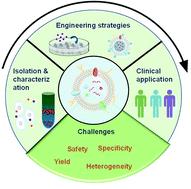当前位置:
X-MOL 学术
›
Biomater. Sci.
›
论文详情
Our official English website, www.x-mol.net, welcomes your feedback! (Note: you will need to create a separate account there.)
Engineering extracellular vesicles for cancer therapy: recent advances and challenges in clinical translation
Biomaterials Science ( IF 6.6 ) Pub Date : 2020-10-13 , DOI: 10.1039/d0bm01385d Sha Li 1, 2, 3, 4, 5 , Jinliang Xu 3, 4, 6, 7, 8 , Jun Qian 8, 9, 10, 11, 12 , Xihui Gao 1, 2, 3, 4, 5
Biomaterials Science ( IF 6.6 ) Pub Date : 2020-10-13 , DOI: 10.1039/d0bm01385d Sha Li 1, 2, 3, 4, 5 , Jinliang Xu 3, 4, 6, 7, 8 , Jun Qian 8, 9, 10, 11, 12 , Xihui Gao 1, 2, 3, 4, 5
Affiliation

|
Extracellular vesicles (EVs) are receiving increasing attention in recent years in the field of cancer treatment. EVs contain specific contents closely related to their donor cells, such as miRNAs, proteins and dsDNAs. As endogenous vesicles, EVs naturally have the characteristics of low toxicity and low immunogenicity and can stably pass through the circulatory system to reach the recipient cells, which make them good carriers to deliver therapeutic agents such as nucleic acid sequences and chemotherapeutics. In many preclinical studies and clinical trials, EVs have demonstrated their unlimited advantages in the field of cancer therapy. However, there are still some challenges that restrict their clinical application, such as yield, heterogeneity, safety, and specificity. In this review, we will focus on the latest breakthrough of EVs in the field of cancer treatment and discuss the challenges in the clinical translation of EVs.
中文翻译:

工程化细胞外囊泡用于癌症治疗:临床翻译的最新进展和挑战
近年来,细胞外囊泡(EVs)在癌症治疗领域中受到越来越多的关注。EV包含与其供体细胞密切相关的特定内容,例如miRNA,蛋白质和dsDNA。作为内源性囊泡,电动汽车自然具有低毒性和低免疫原性的特征,并且可以稳定地通过循环系统到达受体细胞,这使其成为传递诸如核酸序列和化学疗法等治疗剂的良好载体。在许多临床前研究和临床试验中,电动汽车已证明其在癌症治疗领域的无限优势。但是,仍然存在一些限制其临床应用的挑战,例如产量,异质性,安全性和特异性。在这篇评论中
更新日期:2020-11-06
中文翻译:

工程化细胞外囊泡用于癌症治疗:临床翻译的最新进展和挑战
近年来,细胞外囊泡(EVs)在癌症治疗领域中受到越来越多的关注。EV包含与其供体细胞密切相关的特定内容,例如miRNA,蛋白质和dsDNA。作为内源性囊泡,电动汽车自然具有低毒性和低免疫原性的特征,并且可以稳定地通过循环系统到达受体细胞,这使其成为传递诸如核酸序列和化学疗法等治疗剂的良好载体。在许多临床前研究和临床试验中,电动汽车已证明其在癌症治疗领域的无限优势。但是,仍然存在一些限制其临床应用的挑战,例如产量,异质性,安全性和特异性。在这篇评论中


























 京公网安备 11010802027423号
京公网安备 11010802027423号